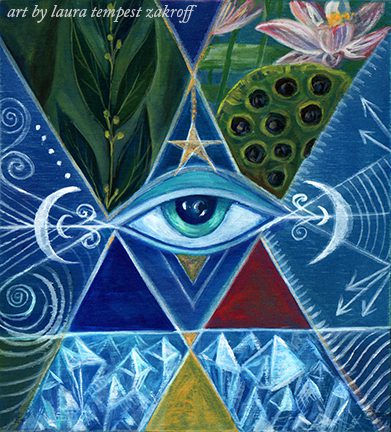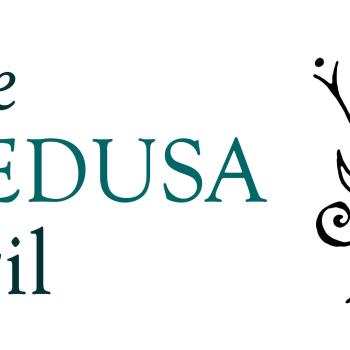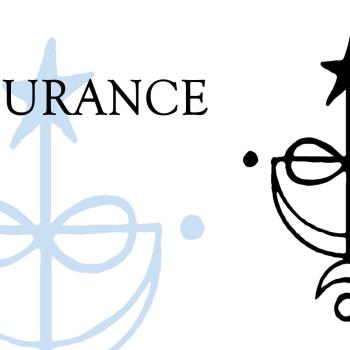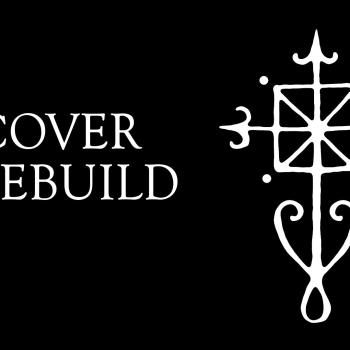Welcome to part 3 in a series of posts exploring the essence of being a Witch, from a Modern Tradition perspective. I’ll be tackling some sticky yet interwoven topics that create and define the Witch – including solo vs. group work, examining religion and spirituality, commerce, morals and ethics, etc. Read part 1 here and part 2 here.
The participant asked: “How do you know the difference between when you’re fearful of change and when it’s legitimate danger? Like when a new deity wants to work with you versus when it’s something else that doesn’t have your best intentions in mind?” The question was raised during the Q&A section of my “Strange Bedfellows” workshop at Paganicon this past March.

(I do believe I warned the class that some of these things will probably end up in a blog post one day. This warning goes for pretty much any class or workshop I teach.)
I thought for a moment, antagonizing about how the answer was going to sound. But I said it anyway: “You should know the difference in your gut.” I then added, “If you haven’t learned to trust yourself enough yet, then take extra precautions to protect yourself.”
It sounds so simple and basic right? Trusting your “gut” and knowing how to interpret it correctly. It’s so incredibly important, valuable, and essential to being an effective Witch. But I would wager that this skill is one of the hardest for modern Witches to develop.
There’s so many reasons for that, including:
-Fear of doing it wrong, being called out, or looking stupid
-Being constantly bombarded with information
-Family dynamics that may not foster self-starting, self-esteem, or confidence
-Educational systems that don’t support critical thinking skills or independence
-Systems that downgrade or insult intuition since it’s “invisible.”
-It’s not a skill you can just absorb from a book or develop overnight.
We’re often so hard on ourselves. We read how other people do things, and instead of going, “that’s a neat way of looking at it” – we may wonder if our way is wrong. Even if it’s been working great with fantastic results. But maybe there’s something we don’t know? It can be incredibly hard to trust ourselves. To listen to our own bodies and thoughts, and consider them in turn.
For example, let’s consider the original workshop question above. I pointed out that there’s a difference between fear of change and fear of safety. It comes down to reading your own body. For example, when I know something will be good for me (like going out to spend time with friends), but the desire to stay home because it’s dark and cold out – that has a distinct physical/mental sensation. It feels like an enormous sleeping bear that doesn’t want to be moved. It wants to be comfortable and take the easy way out, it doesn’t want to experience any discomfort – but it CAN be moved.

Fear of safety feels completely different. It’s like knowing there’s a moving, very awake bear out there that you can smell but you can’t see. It can also feel like there’s been a wall placed in front of you that wasn’t there earlier, or a big heavy gate. Or maybe an arm across your chest – like Mom reaching out instinctively when she has to brake suddenly, despite the fact you’re wearing a seatbelt. Sure you can climb the wall, open the gate, or push past the arm, but you get the sense it may not be a good idea.
All of these involve very real sensations and thought processes in the body. You feel a subtle yet physical response. It can be a sudden sense of excitement, like a light came on to point out a new way, or an overwhelming sense of calm when considering one of two choices. You may feel an adrenaline rush with heart racing or prickly armpits. It could your stomach feeling like it dropped down to your knees. These physical things tell us: be warned, be on guard, protect yourself, make this choice, go that way, stop, protect, push, fight, run. When we connect these gut feelings with our critical thinking and spiritual mind, it can amount to amazing outcomes in our work.
It’s also not such a bad thing to name it “gut instinct.” What does our digestive system do? It takes in all of the liquids and solids we ingest, and changes them into things we can use to live, discarding what we don’t need. Your intuition does the same thing. It takes in all of the information you’re experiencing or have experienced: physical, metaphysical, spiritual, etc – and processes it for the appropriate response.
To foster your own intuition and strengthen gut instinct, I recommend taking a moment to check in with yourself when you’re facing a decision (and you have more than a split second to do it). How do you physically feel about it? What are the pro’s and con’s? How urgent or strongly do you feel about the situation? What are the possible outcomes? If you removed the outside opinions/other forces trying to influence with you, what do you feel is the best solution?
You may want to keep a journal as well, documenting certain situations and answering the questions above. You can also write about things that happened to you, and try to remember how you felt before you did or said a certain thing. Did you get that warning sensation but did it anyway? What happened? Or did you give in to outside pressure and regretted it? This kind of consideration and journaling can help you gain more self-trust on your path as a Witch.
I’ll leave you with the following quote by Albert Einstein: “I believe in intuition and inspiration. Imagination is more important than knowledge. For knowledge is limited, whereas imagination embraces the entire world, stimulating progress, giving birth to evolution. It is, strictly speaking, a real factor in scientific research.”













